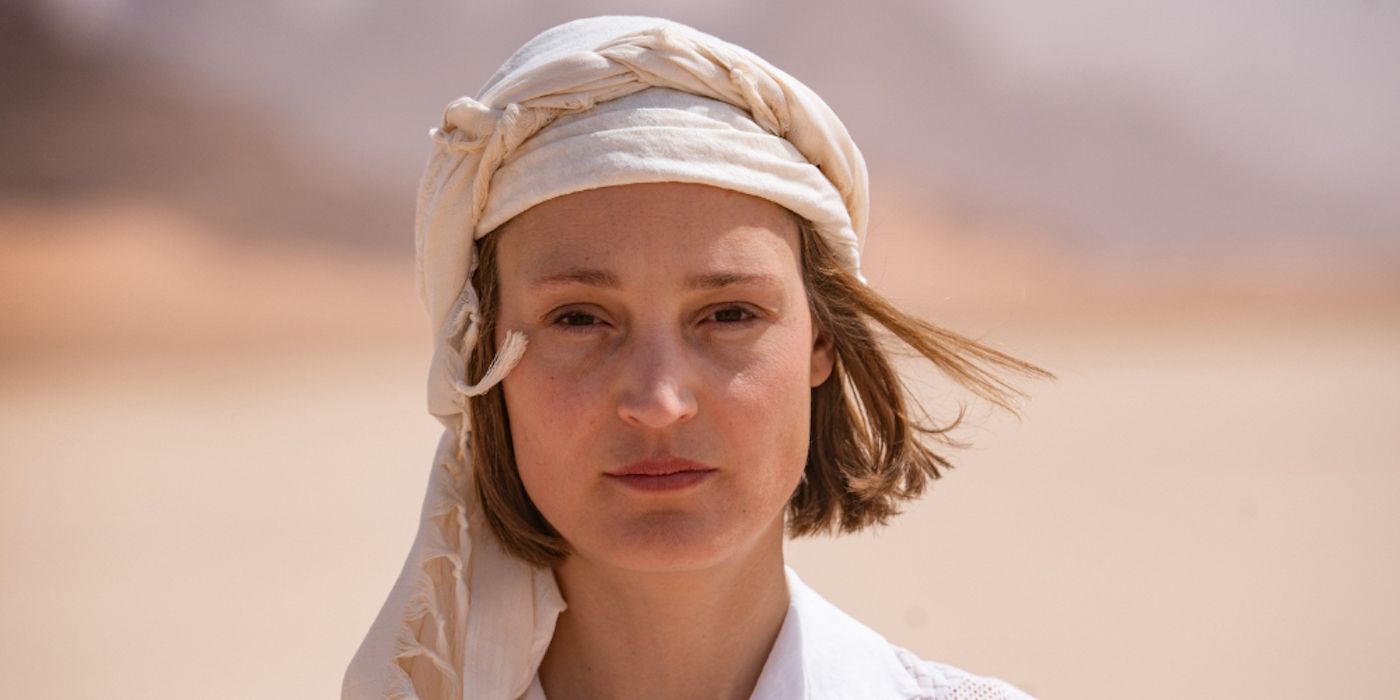"Men understand little about women. That's why it's so important for them to represent themselves." These words are chanted right at the beginning of Ingeborg Bachmann – Journey into the Desert as some sort of intellectual pick-up line. Still, they reflect the concern at the heart of the biopic. Because by revealing the nuances and contradictions of Austrian writer and feminist icon Ingeborg Bachmann (played by Vicky Krieps), director Margarethe von Trotta delivers a thoughtful exploration of love in a patriarchal society, which ends up being surprisingly hopeful considering how cruel reality can be.
Biopic tradition dictates that to explore the life of any historical personality, we need to make it clear how they became successful and how tragically they’ve disappeared from the world. Journey into the Desert is aware of public expectations, as it begins by showing Bachmann's unstable mental health, due in large part to her severe pill addiction. However, it doesn't take long for the biopic to completely distance itself from this grim – but ultimately minor – aspect of Bachmann's life.
In fact, Journey into the Desert seems unconcerned about Bachmann's death and about her rise to success. The writer's success is an indisputable fact, and Journey into the Desert decides it would better serve Bachmann’s memory if it focused on the confident woman she was, perfectly aware of her own achievements. So, instead, the movie explores Bachmann's chaotic relationship with playwright Max Frisch (played by Ronald Zehrfeld), only dwelling on a specific period of the poet’s life. Bachmann's love for Frisch will take her on a long journey through Europe as she tries to keep her relationship with a man who ultimately cannot accept her to completely escape the boundaries of gender roles. And by keeping the focus on Bachmann’s inspiring perspective on love, Journey into the Desert becomes a universal tale of perseverance in the face of social limitations regarding female sexuality.
What makes Journey into the Desert so interesting is that the movie paints Bachmann as a layered human. Despite having the material independence most women couldn’t boast in the middle of the 20th century, Bachmann still falls madly in love with a man that hides his sexism behind his genuine admiration for his partner’s mind. But while Frisch was drawn to Bachmann's intellect, he still expected her to put his needs above hers. And when she doesn’t, he becomes resentful. Apart from being an oppressive man, Frisch's envy for Bachmann’s success and rooted beliefs about a woman’s role slip through the cracks of everyday life. That only makes the couple’s emotional journey more interesting, as it serves as the perfect example of how sexism can sneak into relationships and affect women who are brilliant and conscious of their own worth.
Journey into the Desert also follows Bachmann during her many sexual adventures, exploring her vision of love and desire as fluid energies that shouldn’t be contained by monogamous relationships. To Bachmann, the inner universe of any human will never be entirely understood by a single partner. So, while maintaining a serious relationship with Frisch, she still meets other people, including composer Hans Werner Henze (Basil Eidenbenz). And even if Frisch agrees to have an open relationship with Bachmann, he lets jealousy control his impulses, slowly becoming more violent towards his partner due to her other lovers.
It is fascinating how Journey into the Desert puts the whole concept of monogamy in question by showing how exclusivity is often connected to a toxic desire to possess another person. At the same time, other lovers never diminish Bachmann’s love for Frisch, as for her, it’s clear that affection is not a limited resource that’s spent when you give it to someone. Many books were already written to explore the connection between monogamy and legal marriage and female oppression, but Journey into the Desert finds very humane and emotional ways to open the subject to the discussion while also revealing why Bachmann's work and history became so crucial for the European feminist movement long after her death.
For everything it does well, Ingeborg Bachmann – Journey into the Desert is not immune to some pacing issues. The story is told in two central moments of Bachmann's life. The first narrative shows how Bachmann meets Frisch and decides to build a life by his side. The second takes us after the breakup that broke Bachmann’s heart, as she goes on a getaway trip with Adolf Opel (played by Tobias Resch), a man who shows her there are still many different and healthy ways to find love after Frisch. Inside each major storyline, the movie jumps from city to city, and from moment to moment without warning, which causes momentary confusion while the audience tries to figure out when each event is happening. This problem disappears after the first arc of Journey into the Desert, when the characters and their intertwined lives are already well-established. Still, Journey into the Desert could have had a smoother start.
Despite some editing shortcomings, by exploring two moments of Bachmann's life, the biopic allows the audience to understand the negative impact Frisch has on the writer’s life. At the same, Resch helps Bachmann to rediscover her own desires and find new pleasures, even after thinking she had lost the love of her life. Thanks to this creative decision, Journey into the Desert wraps Bachmann on a positive note, as if to say all the pain and suffering she endured was worth standing her ground, and that there was nothing wrong with the way she viewed relationships, be they romantic or sexual. When so many biopics end in disasters, it is definitely worth praising a refreshing take on the genre, especially when it focuses on a woman who’s equally complicated and fascinating.
Rating: B+
Ingeborg Bachmann – Journey into the Desert had its world premiere at 2023’s Berlin Film Festival.


